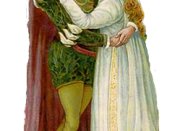The title of a book can often illuminate the central idea of the book. In The Catcher in the Rye the meaning of the title becomes clear when Holden's sister asks him what he wants to be, and he says that all he wants to be is the "catcher in the rye" from a popular children's song. In this role he envisions himself as the lone guardian watching a group of children playing on a cliff; he alone can save them from plummeting into the abyss (Salinger 173). At this point it becomes apparent to the reader that the title The Catcher in the Rye reveals Holden's desire to protect the innocent, a desire which can be seen in his relationships with his family, children, Jane Gallagher, and other complete strangers and even in his observations of inhuman things.
Holden's desire to protect the innocent is seen throughout the book in his relationships with members of his family.
In fact, one of the very first indications that Holden treasures innocence above all can be found in the first chapter of the novel when he calls his brother D.B. a "prostitute" for going out to Hollywood to write scripts rather than continuing to write short stories (Salinger 2). D.B. gave up pure art in a simple form, writing short stories, in order to conform to a world Holden sees as "phoney" and corrupt. Holden cannot forgive his brother for destroying the innocence of his art. Holden's relationship with his other brother, Allie, also demonstrates his desire to protect and preserve the innocent. Allie is dead at the beginning of the novel, and, as such, he represents an unchanging innocence, a "saint ideal" to Holden (Baumbach 68). Throughout the novel the reader is reminded of Holden's attachment to this dead "saint...


